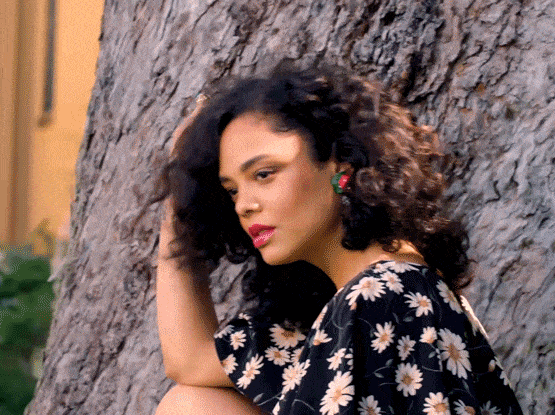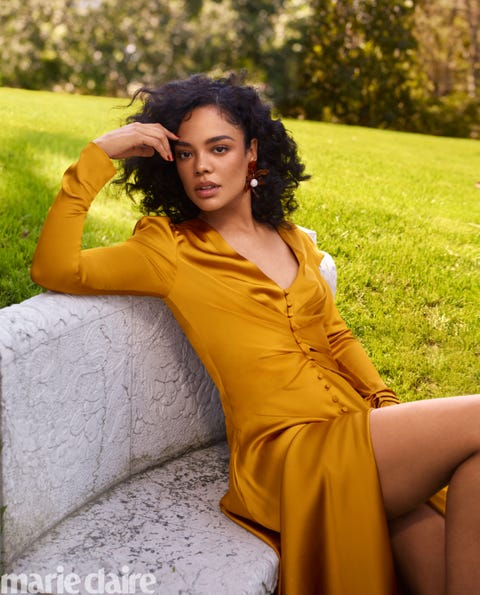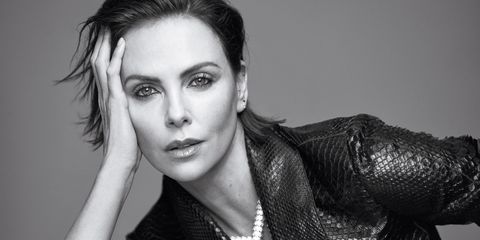It's not long into brunch at a low-key restaurant on L.A.’s Eastside that Tessa Thompson starts showing me her tattoos. “I’m slightly addicted,” she confesses. “I scar so easily. I was like, I might as well just scar myself.”
She pulls up one pant leg to reveal a trio of dots on her ankle, put there by Taika Waititi, who directed her in 2017’s Thor: Ragnarok (three for the third film in the franchise). Thompson thinks of the tattoo as “an ellipsis or”—she laughs—“like the bane of my existence: those dots on my iPhone when someone I’m texting is writing.” She looks at me with narrowed eyes: “You’re married, so you don’t know about that anymore.”
Thompson’s love life is the subject of much intrigue, but our tattoo tour is far from over. There’s a 5 on the actress’s rib cage beneath her shirt, and a chai—the Jewish symbol for life—on her inner wrist shares real estate with a cursive yes that was inspired by an early Yoko Ono installation. “Do you know this story?” she asks. Ono installed a ladder in the middle of the gallery; if you climbed it, you could use a magnifying glass to find a tiny yes on the ceiling. John Lennon came through and inquired after the artist, and the rest is history. “It’s cheesy,” Thompson says sheepishly. “But it’s really cute.”
On her other arm she’s inked the word no. “I think of it as the yes is for people,” she explains, “and this no is for me.” It’s a good reminder: Thompson, 35, has been a screen actor for 15-odd years, but in the last five her career has gone into overdrive—enough that she’d better get good at turning people down. This week has been particularly nuts. A day ago, she wrapped Sylvie, a forthcoming love story set in midcentury Harlem, and got home just in time to see the sun come up. Soon she’ll start shooting season three of HBO’s Westworld, in which she plays villainous corporate exec Charlotte Hale, but in the meantime she’s voicing Lady in November’s live-action adaptation of Lady and the Tramp and tying up loose ends on Men in Black: International, out now, in which she stars as Agent M opposite Chris Hemsworth. (It's not their first rodeo: She's Valkyrie to his Thor in the Marvel universe, making them a little “like Hepburn and Tracy. We’re trying to do that old-Hollywood thing: ‘It’s us again! Still like us?’”) “I’m really lucky to be inside of projects that I’m obligated to,” she acknowledges, “but it means that I’m increasingly aware of the finite time that I have to make the things I just want to do. I’ve slotted them into any little window, which means”—longish pause—“I just don’t have any windows right now.”
Thompson arrived at our interview a little late and slightly rattled. “I drove here,” she tells me, “which is big for me.” Years ago, she got into a bad car accident and for a while “was just too scattered” to get behind the wheel—a major liability in L.A., where she largely grew up. Her parents separated when she was three; her dad, a musician, moved to New York and had two more kids, and her mom, a college administrative assistant and artist, raised her two daughters—Thompson’s older sister is now a nurse—in “teeny little apartments” in central Hollywood and Santa Monica.
It’s a warm, sunny day, but Thompson, her hair slicked back, is wearing a vintage Jil Sander pinstriped pantsuit. It cuts against the grain of her general vibe: thoughtful, humble, feminine, mellow enough to make her C-suite getup feel almost casual. (She compares it to sweats: “so comfortable!”) For a trip to Paris last winter for Fashion Week, as an experiment, she packed only suits. “I was like, This is such a good way to travel. It’s so easy.” It’s also on theme with MIB, in which she and Hemsworth wear Paul Smith–tailored versions of the suits Tommy Lee Jones and Will Smith made famous in 1997.
The best joke in the trailer is suit related, a flirty rat-a-tat between Thompson and Emma Thompson, who plays the MIB London headquarters chief, Agent O. By phone, the English actress gushes about her co-star, calling her “immensely impressive,” with the “discipline of Genghis Kahn. She’s made of steel but at the same time incredibly calm.” Tessa is equally effusive about Emma, launching into a story about their first day shooting together: Nervous to make a good impression, she fell into a deep sleep on the way to set, then, discombobulated, opened her car door directly onto the veteran actress. “I’m horrified, right? She gave me a hug and was like, ‘God, you’re exhausted.’” Tessa deepens her voice and affects Emma’s plummy accent. “She kept saying to me, ‘You must take care of yourself.’ I really needed to hear that.” Emma eventually convinced Tessa to join her at her favorite spa in the British countryside, which the younger actress describes as “like the after life: just a bunch of English people in bathrobes walking around getting treatments. I was like, What is my life? I’m walking the grounds with Emma Thompson!”
Here’s the thing: She never set out for action stardom or casual spa days with Britain’s finest thespians or anything else really. Her path was haphazard. In the early aughts, she was studying cultural anthropology at Santa Monica College and preparing to transfer to the University of California, Berkeley, when she encountered an all-female Shakespeare ensemble whose rigorous, linguistic approach to the Bard’s plays opened a door in her young brain. Thompson dropped out of college. Soon she was starring in a Pasadena theater production of Romeo and Juliet when her photo landed on the cover of the Los Angeles Times arts section, and Hollywood came calling.
She identifies a few breakthrough moments in her early career, including a role as a striving student torn between family and future in Tina Mabry’s moving 2009 drama, Mississippi Damned. Thompson is white and Mexican on her mom’s side and Afro-Panamanian and black on her dad’s. Many of her directors have been black: Mabry; Ryan Coogler, who cast her as Michael B. Jordan’s hearing-impaired girlfriend in Creed; Steven Caple Jr., who directed her in Creed 2; Boots Riley, who tapped her as his leading lady in last year’s Sorry to Bother You; Justin Simien for Dear White People; Ava DuVernay for Selma; Nia DaCosta for the recent indie Little Woods; F. Gary Gray for MIB; Tyler Perry for 2010’s For Colored Girls. “It remains the only way,” she declares. “I look at actresses who are not of color and at the opportunities that they’re presented in terms of directors wanting to make work for them. When I look at my contemporaries of color, it’s only other artists of color who are doing that in a real, robust way.”
With the aforementioned films, Marvel, Westworld, plus a side hustle producing her own projects—Little Woods, Sylvie, and more in the works—Thompson’s certainly not wanting for opportunity, but MIB has the potential to unlock a different level of industry clout. It’s not lost on her that the 1997 original helped cement Will Smith as a box-office juggernaut, particularly internationally, where conventional wisdom has long held that black actors don’t perform as well as white ones—a racist and self-fulfilling narrative that she can’t believe we still subscribe to. Thompson notes wearily the way the press regarded the success of Jordan Peele’s Us “as if it’s so surprising.” Ditto Black Panther: “The idea that it was shocking is just tired.”
An active, enthusiastic member of Time’s Up—she is one of the most vocal proponents of the 4% Challenge, urging members of the film community to commit to working with female directors—Thompson is candid about the specific struggle actresses of color face. “When we talk about issues of pay equity, that means something different to Natalie Portman than it does to me. Women who are not of color are talking about pay equity with men. [We] are so far away from that.” I ask about her contract negotiations for MIB, which she toplines alongside Hemsworth, one of the most bankable white actors of the moment. The dialogue sparked by Time’s Up “allowed me to say things I’m not sure I would have said a year ago,” she attests. “The truth is, the system where you assess international value is inherently sexist and racist because we haven’t had those opportunities. The only way to disrupt that is to create new models. When we were having the conversation around how we structure our deals, I said, ‘I understand who Chris Hemsworth is and who I am not relative to him, globally and otherwise. But in the success of the film, that changes. In success, I want equity. Because then you can’t make the same argument.’” Did she get what she wanted? “Let’s just say we’re all happy.”
We’re well into our meal by the time I ask about her collaboration with Janelle Monáe on last year’s “emotion picture” Dirty Computer, a series of linked music videos in which she and the singer play star-crossed lovers in some dystopic future. The project blew up the Internet. In the most famous of the videos—for the song “Pynk”—Monáe dances around in a pair of outrageously vaginal pants, with Thompson’s head popping out between her legs, precisely where the clitoris might go.
That, plus a few affectionate red-carpet and Instagram appearances, led to feverish speculation about whether the two, each of whom has spoken in interviews about her fluid sexuality, might have been romantically involved. Thompson, who first met Monáe when they were auditioning for the same part in a David O. Russell movie, isn’t going there. (She does confirm she’s currently single.) “I didn’t like that,” she says about the media scrutiny, an unpleasant occupational hazard. “We live inside such a clickbait space, where you say one thing about your experience and then it gets categorized by somebody else, and you get further and further away from the truth.” She mentions one writer who misrepresented her feelings about cats (let the record show: Thompson doesn’t hate them; she’s just allergic) and another interview in which comments she made about her sexuality—direct quote: “I’m attracted to men and also to women”—got spun by Internet gossip mongers as some sort of major coming-out moment.
The point is, people tend to run with their take on things. Like “Pynk”: I frame it as a sort of feminist manifesto, but Thompson gently deflects. “I think I’m too close to it probably to see it the way you see it. Like, things got written about my head popping out of those pants. It wasn’t that high-concept. We were just messing around. We had no conversations about me playing a clitoris. We knew it would look funny. You’re making things with friends. Your friends start laughing.”
When I ask around among my own L.A. friends, everyone has a Thompson story. My musician ex played a few shows with her when she used to sing with the band Caught a Ghost. A pal recently took a yoga class where Thompson was savasana-ing a few mats over. Another friend, the proprietor of a stylish Silver Lake cafe, says the actress comes in all the time and really knows her food and wine (thanks to her dad and stepmom, who now run a Bolinas, California, restaurant where Thompson has been known to bartend and DJ and make the occasional salad). When I relay these connections, she seems genuinely pleased to be woven into the fabric of regular-person L.A. “I have a weird relationship to the idea of fame,” she says. “I really, really dislike the word celebrity. Famous? I don’t really like that word either.” At the same time, “a huge part of my relationship to myself is tethered to my work. I admire the people that are like, ‘This is my job. I can make a lot of money doing this thing. It doesn’t threaten my self-image or my sense of worth.’ I am not that way. It really, really bums me out, the idea of making things that are bad.”
After we part ways, Thompson’s headed off to look at a near-by house she might move into, though she feels destined one day to live in New York, where she spent a lot of time as a kid with her dad, bumming around downtown institutions like Kim’s Video and Max Fish back when “the Lower East Side was still the Lower East Side.” In New York, she loves “how you’re all at once plugged in and connected and totally invisible.” Recently she had a couple of days off, so she flew to the city. She saw some theater, played ping-pong, ate pierogies, browsed at the Strand bookstore. And then she spent hours people-watching in Washington Square Park. A few fans took her picture; a kid asked her to sign his Converse; she had a nice conversation with a woman named Betty who was in town visiting her daughter and had no idea who Thompson was. The thing that scares her about fame, Thompson says, is imagining a future in which she can’t sit around Washington Square Park chatting up a stranger.
It brings to mind something Boots Riley told me. “She loves people,” he said. “It goes into how she makes the character, but you also see it in the rest of her life.” Once, at her birthday party, when everyone was a little drunk, he asked Thompson why someone like her wanted to be an actor. “I just want to be everyone,” she replied. “I want to play everyone.’”
When I repeat this to Thompson, she nods. “I really do like people very much. If you’re an actor, you’re in the business of empathy. It’s a weird skill.” She once had a job fund-raising on the street for an NGO. “I would ask someone for money, they would give it to me, and then they would go, ‘What is it for again?’ It was clear they hadn’t heard a word I said; they had just seen me, and they knew how I felt about what I was asking for. I remember being like, That’s wild! That’s crazy that you can do that.”
She’d make a great con artist, I suggest. Thompson chuckles, smiling her 1,000-watt smile, the kind that makes it easy to understand why strangers might open their wallets. “It’s a good thing I’m empathetic,” she says, her voice high and sweet. “Otherwise, I might be a sociopath.”
Shop Tessa's Beauty Look
This article originally appears in the July 2019 issue of Marie Claire, on newsstands June 25.
Photography: Thomas Whiteside
Styling: J. Errico
Hair: Lacy Redway at the wall group for Nexxus
Makeup: Alex Babsky for Chanel Beauty at The Visionaries
Manicure: Stephanie Stone at Forward Artists for Essie
Production: Liz Komroy for 3 Star Productions























